Inclusive Education: Policies and Practices in Early Childhood
VerifiedAdded on 2022/08/27
|12
|3729
|49
Essay
AI Summary
This essay delves into the critical aspects of inclusive education within early childhood settings. It begins by defining inclusive education and emphasizing its importance, particularly for young children. The essay then explores relevant policies and legislation, both international and national, that support inclusive practices. It examines key theories, such as those of Jean Piaget and Lev Vygotsky, to understand how children learn and how educators can best support their development within an inclusive environment. The role of families, communities, and educators in fostering inclusive environments is also discussed. Furthermore, the essay addresses barriers to inclusive education and explores strategies to overcome these challenges, including the implementation of inclusion support programs. The work also explores how TAFE institutions approach the concept of inclusiveness, the language of inclusion, and practical teaching strategies. Finally, it highlights the importance of research-based practices and family-centered approaches in creating effective inclusive programs.
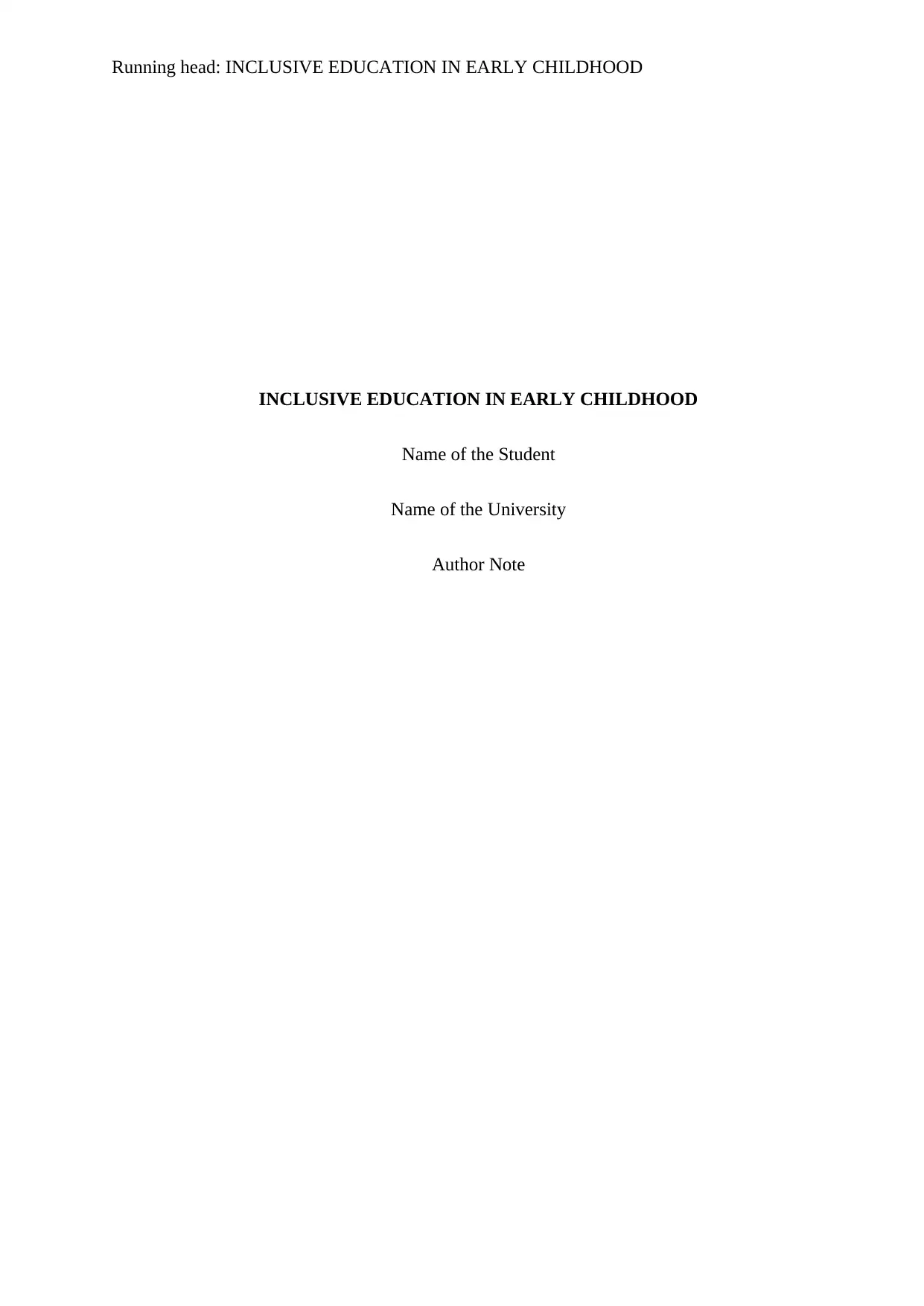
Running head: INCLUSIVE EDUCATION IN EARLY CHILDHOOD
INCLUSIVE EDUCATION IN EARLY CHILDHOOD
Name of the Student
Name of the University
Author Note
INCLUSIVE EDUCATION IN EARLY CHILDHOOD
Name of the Student
Name of the University
Author Note
Paraphrase This Document
Need a fresh take? Get an instant paraphrase of this document with our AI Paraphraser
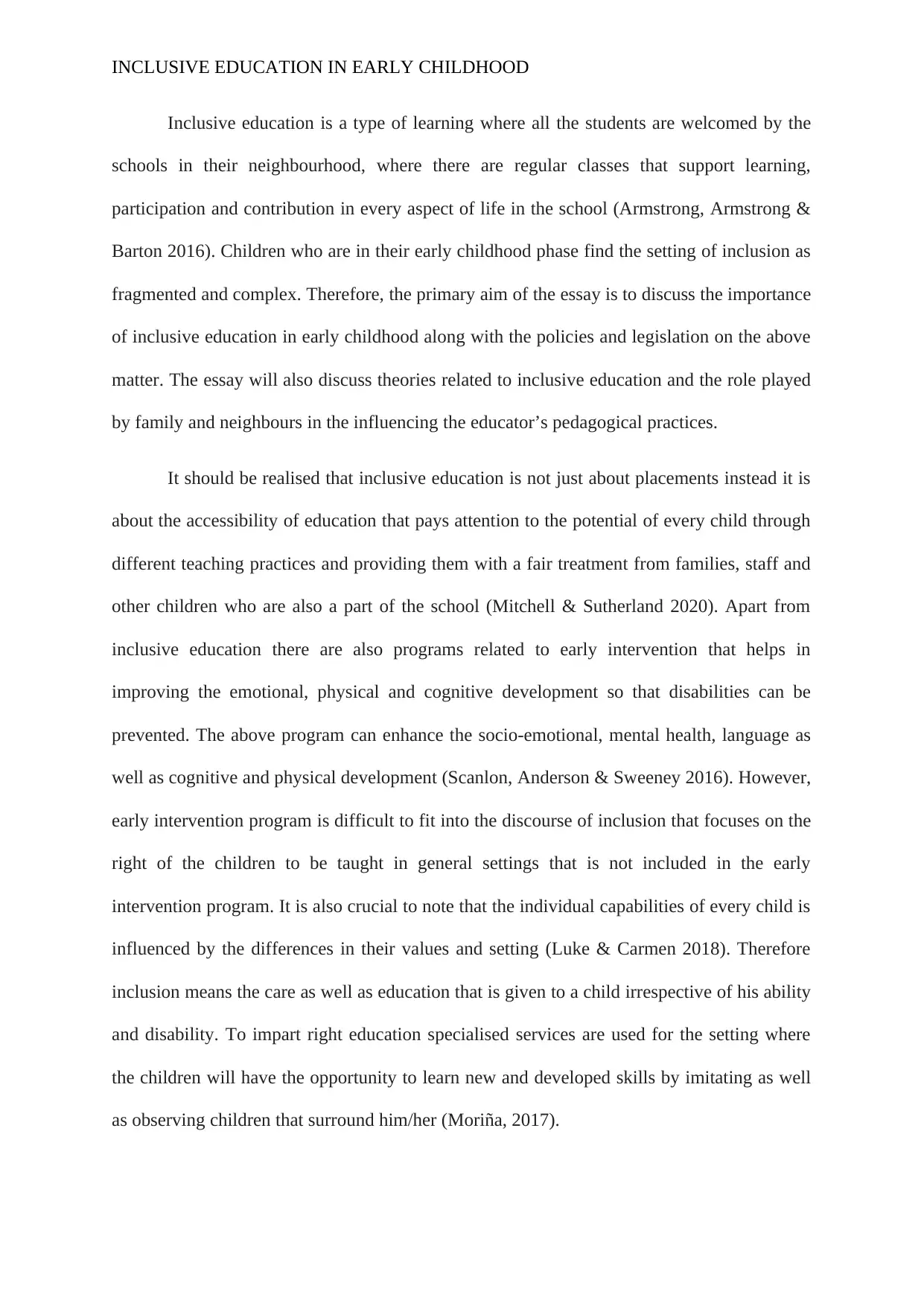
INCLUSIVE EDUCATION IN EARLY CHILDHOOD
Inclusive education is a type of learning where all the students are welcomed by the
schools in their neighbourhood, where there are regular classes that support learning,
participation and contribution in every aspect of life in the school (Armstrong, Armstrong &
Barton 2016). Children who are in their early childhood phase find the setting of inclusion as
fragmented and complex. Therefore, the primary aim of the essay is to discuss the importance
of inclusive education in early childhood along with the policies and legislation on the above
matter. The essay will also discuss theories related to inclusive education and the role played
by family and neighbours in the influencing the educator’s pedagogical practices.
It should be realised that inclusive education is not just about placements instead it is
about the accessibility of education that pays attention to the potential of every child through
different teaching practices and providing them with a fair treatment from families, staff and
other children who are also a part of the school (Mitchell & Sutherland 2020). Apart from
inclusive education there are also programs related to early intervention that helps in
improving the emotional, physical and cognitive development so that disabilities can be
prevented. The above program can enhance the socio-emotional, mental health, language as
well as cognitive and physical development (Scanlon, Anderson & Sweeney 2016). However,
early intervention program is difficult to fit into the discourse of inclusion that focuses on the
right of the children to be taught in general settings that is not included in the early
intervention program. It is also crucial to note that the individual capabilities of every child is
influenced by the differences in their values and setting (Luke & Carmen 2018). Therefore
inclusion means the care as well as education that is given to a child irrespective of his ability
and disability. To impart right education specialised services are used for the setting where
the children will have the opportunity to learn new and developed skills by imitating as well
as observing children that surround him/her (Moriña, 2017).
Inclusive education is a type of learning where all the students are welcomed by the
schools in their neighbourhood, where there are regular classes that support learning,
participation and contribution in every aspect of life in the school (Armstrong, Armstrong &
Barton 2016). Children who are in their early childhood phase find the setting of inclusion as
fragmented and complex. Therefore, the primary aim of the essay is to discuss the importance
of inclusive education in early childhood along with the policies and legislation on the above
matter. The essay will also discuss theories related to inclusive education and the role played
by family and neighbours in the influencing the educator’s pedagogical practices.
It should be realised that inclusive education is not just about placements instead it is
about the accessibility of education that pays attention to the potential of every child through
different teaching practices and providing them with a fair treatment from families, staff and
other children who are also a part of the school (Mitchell & Sutherland 2020). Apart from
inclusive education there are also programs related to early intervention that helps in
improving the emotional, physical and cognitive development so that disabilities can be
prevented. The above program can enhance the socio-emotional, mental health, language as
well as cognitive and physical development (Scanlon, Anderson & Sweeney 2016). However,
early intervention program is difficult to fit into the discourse of inclusion that focuses on the
right of the children to be taught in general settings that is not included in the early
intervention program. It is also crucial to note that the individual capabilities of every child is
influenced by the differences in their values and setting (Luke & Carmen 2018). Therefore
inclusion means the care as well as education that is given to a child irrespective of his ability
and disability. To impart right education specialised services are used for the setting where
the children will have the opportunity to learn new and developed skills by imitating as well
as observing children that surround him/her (Moriña, 2017).
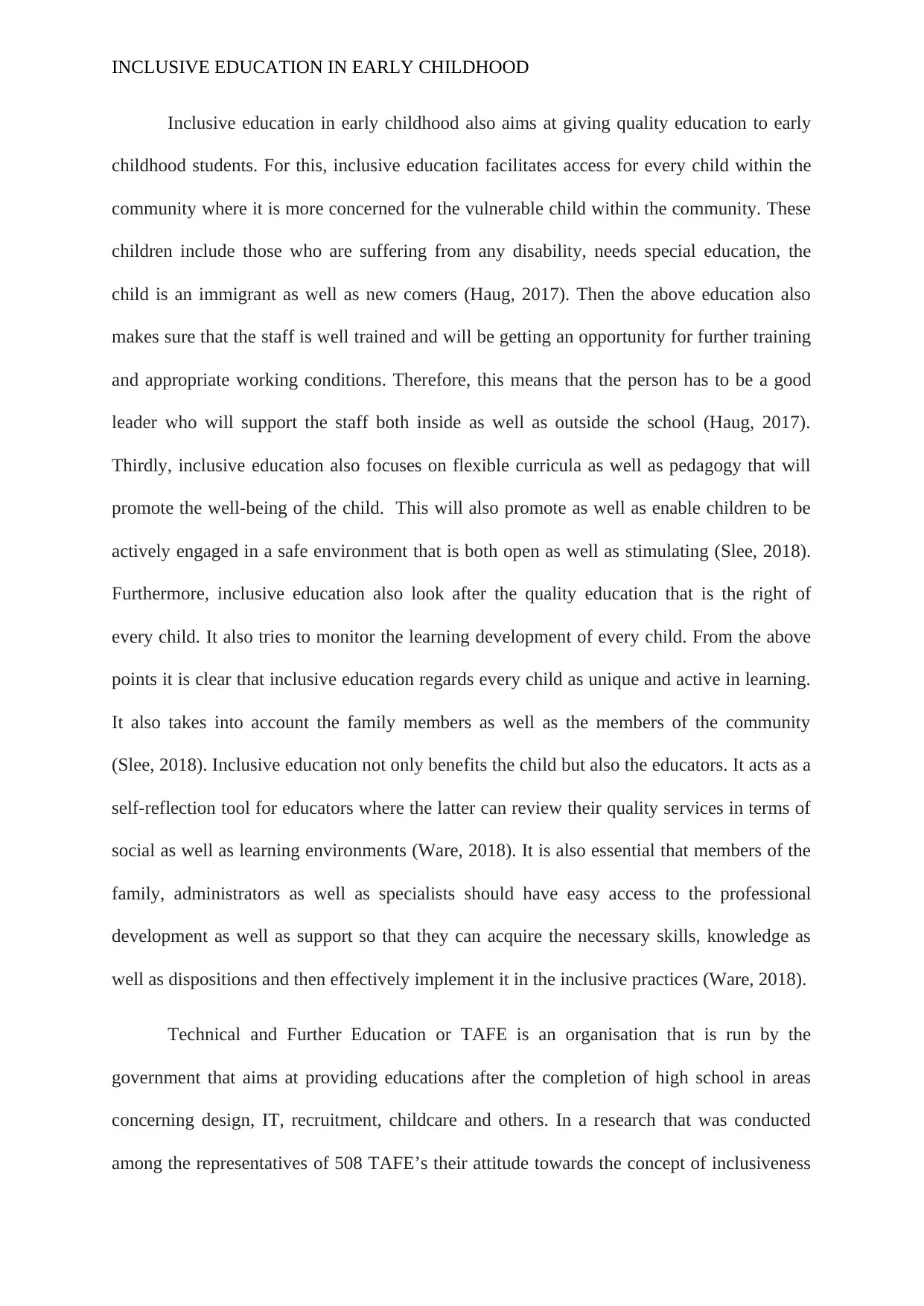
INCLUSIVE EDUCATION IN EARLY CHILDHOOD
Inclusive education in early childhood also aims at giving quality education to early
childhood students. For this, inclusive education facilitates access for every child within the
community where it is more concerned for the vulnerable child within the community. These
children include those who are suffering from any disability, needs special education, the
child is an immigrant as well as new comers (Haug, 2017). Then the above education also
makes sure that the staff is well trained and will be getting an opportunity for further training
and appropriate working conditions. Therefore, this means that the person has to be a good
leader who will support the staff both inside as well as outside the school (Haug, 2017).
Thirdly, inclusive education also focuses on flexible curricula as well as pedagogy that will
promote the well-being of the child. This will also promote as well as enable children to be
actively engaged in a safe environment that is both open as well as stimulating (Slee, 2018).
Furthermore, inclusive education also look after the quality education that is the right of
every child. It also tries to monitor the learning development of every child. From the above
points it is clear that inclusive education regards every child as unique and active in learning.
It also takes into account the family members as well as the members of the community
(Slee, 2018). Inclusive education not only benefits the child but also the educators. It acts as a
self-reflection tool for educators where the latter can review their quality services in terms of
social as well as learning environments (Ware, 2018). It is also essential that members of the
family, administrators as well as specialists should have easy access to the professional
development as well as support so that they can acquire the necessary skills, knowledge as
well as dispositions and then effectively implement it in the inclusive practices (Ware, 2018).
Technical and Further Education or TAFE is an organisation that is run by the
government that aims at providing educations after the completion of high school in areas
concerning design, IT, recruitment, childcare and others. In a research that was conducted
among the representatives of 508 TAFE’s their attitude towards the concept of inclusiveness
Inclusive education in early childhood also aims at giving quality education to early
childhood students. For this, inclusive education facilitates access for every child within the
community where it is more concerned for the vulnerable child within the community. These
children include those who are suffering from any disability, needs special education, the
child is an immigrant as well as new comers (Haug, 2017). Then the above education also
makes sure that the staff is well trained and will be getting an opportunity for further training
and appropriate working conditions. Therefore, this means that the person has to be a good
leader who will support the staff both inside as well as outside the school (Haug, 2017).
Thirdly, inclusive education also focuses on flexible curricula as well as pedagogy that will
promote the well-being of the child. This will also promote as well as enable children to be
actively engaged in a safe environment that is both open as well as stimulating (Slee, 2018).
Furthermore, inclusive education also look after the quality education that is the right of
every child. It also tries to monitor the learning development of every child. From the above
points it is clear that inclusive education regards every child as unique and active in learning.
It also takes into account the family members as well as the members of the community
(Slee, 2018). Inclusive education not only benefits the child but also the educators. It acts as a
self-reflection tool for educators where the latter can review their quality services in terms of
social as well as learning environments (Ware, 2018). It is also essential that members of the
family, administrators as well as specialists should have easy access to the professional
development as well as support so that they can acquire the necessary skills, knowledge as
well as dispositions and then effectively implement it in the inclusive practices (Ware, 2018).
Technical and Further Education or TAFE is an organisation that is run by the
government that aims at providing educations after the completion of high school in areas
concerning design, IT, recruitment, childcare and others. In a research that was conducted
among the representatives of 508 TAFE’s their attitude towards the concept of inclusiveness
⊘ This is a preview!⊘
Do you want full access?
Subscribe today to unlock all pages.

Trusted by 1+ million students worldwide
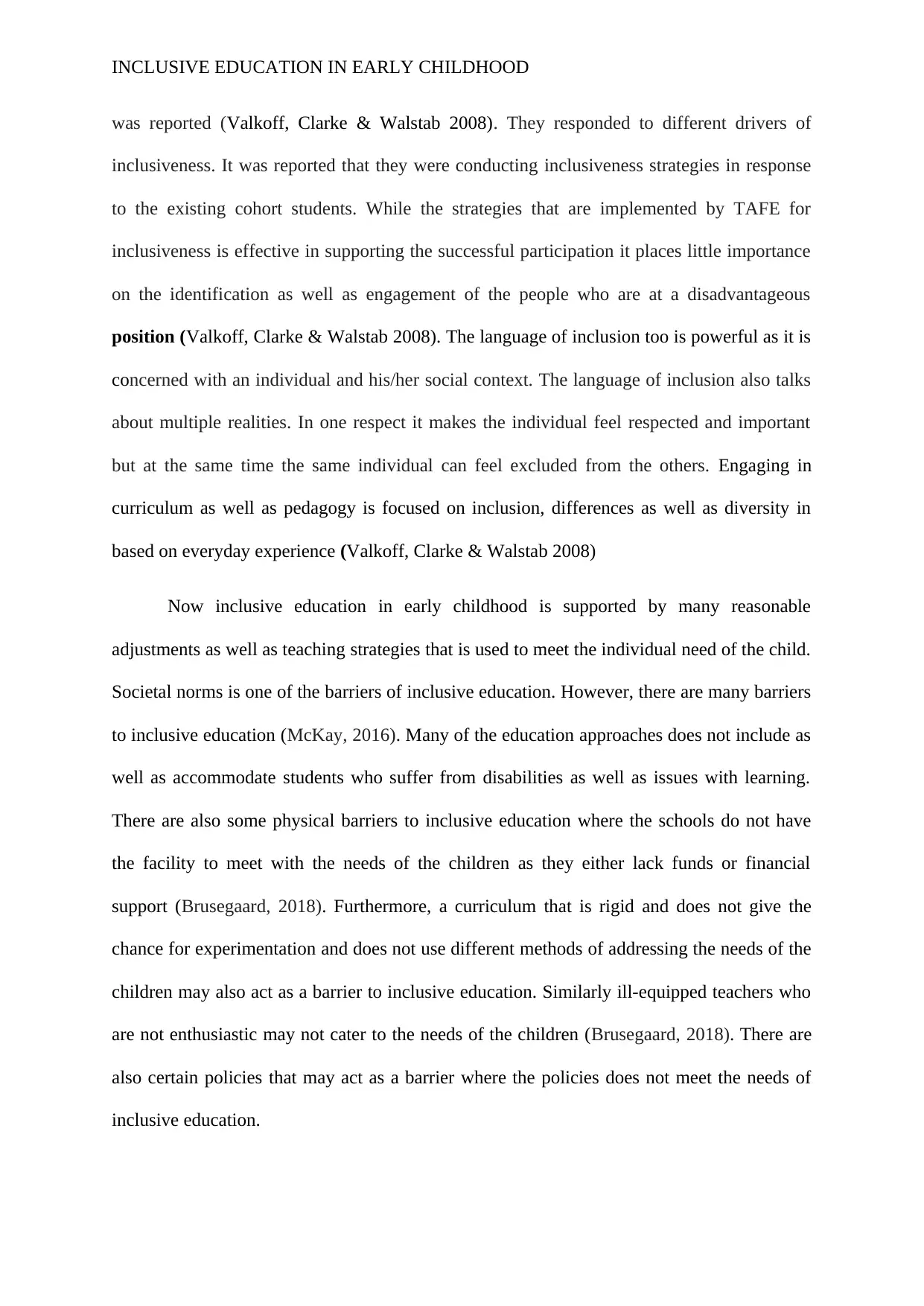
INCLUSIVE EDUCATION IN EARLY CHILDHOOD
was reported (Valkoff, Clarke & Walstab 2008). They responded to different drivers of
inclusiveness. It was reported that they were conducting inclusiveness strategies in response
to the existing cohort students. While the strategies that are implemented by TAFE for
inclusiveness is effective in supporting the successful participation it places little importance
on the identification as well as engagement of the people who are at a disadvantageous
position (Valkoff, Clarke & Walstab 2008). The language of inclusion too is powerful as it is
concerned with an individual and his/her social context. The language of inclusion also talks
about multiple realities. In one respect it makes the individual feel respected and important
but at the same time the same individual can feel excluded from the others. Engaging in
curriculum as well as pedagogy is focused on inclusion, differences as well as diversity in
based on everyday experience (Valkoff, Clarke & Walstab 2008)
Now inclusive education in early childhood is supported by many reasonable
adjustments as well as teaching strategies that is used to meet the individual need of the child.
Societal norms is one of the barriers of inclusive education. However, there are many barriers
to inclusive education (McKay, 2016). Many of the education approaches does not include as
well as accommodate students who suffer from disabilities as well as issues with learning.
There are also some physical barriers to inclusive education where the schools do not have
the facility to meet with the needs of the children as they either lack funds or financial
support (Brusegaard, 2018). Furthermore, a curriculum that is rigid and does not give the
chance for experimentation and does not use different methods of addressing the needs of the
children may also act as a barrier to inclusive education. Similarly ill-equipped teachers who
are not enthusiastic may not cater to the needs of the children (Brusegaard, 2018). There are
also certain policies that may act as a barrier where the policies does not meet the needs of
inclusive education.
was reported (Valkoff, Clarke & Walstab 2008). They responded to different drivers of
inclusiveness. It was reported that they were conducting inclusiveness strategies in response
to the existing cohort students. While the strategies that are implemented by TAFE for
inclusiveness is effective in supporting the successful participation it places little importance
on the identification as well as engagement of the people who are at a disadvantageous
position (Valkoff, Clarke & Walstab 2008). The language of inclusion too is powerful as it is
concerned with an individual and his/her social context. The language of inclusion also talks
about multiple realities. In one respect it makes the individual feel respected and important
but at the same time the same individual can feel excluded from the others. Engaging in
curriculum as well as pedagogy is focused on inclusion, differences as well as diversity in
based on everyday experience (Valkoff, Clarke & Walstab 2008)
Now inclusive education in early childhood is supported by many reasonable
adjustments as well as teaching strategies that is used to meet the individual need of the child.
Societal norms is one of the barriers of inclusive education. However, there are many barriers
to inclusive education (McKay, 2016). Many of the education approaches does not include as
well as accommodate students who suffer from disabilities as well as issues with learning.
There are also some physical barriers to inclusive education where the schools do not have
the facility to meet with the needs of the children as they either lack funds or financial
support (Brusegaard, 2018). Furthermore, a curriculum that is rigid and does not give the
chance for experimentation and does not use different methods of addressing the needs of the
children may also act as a barrier to inclusive education. Similarly ill-equipped teachers who
are not enthusiastic may not cater to the needs of the children (Brusegaard, 2018). There are
also certain policies that may act as a barrier where the policies does not meet the needs of
inclusive education.
Paraphrase This Document
Need a fresh take? Get an instant paraphrase of this document with our AI Paraphraser
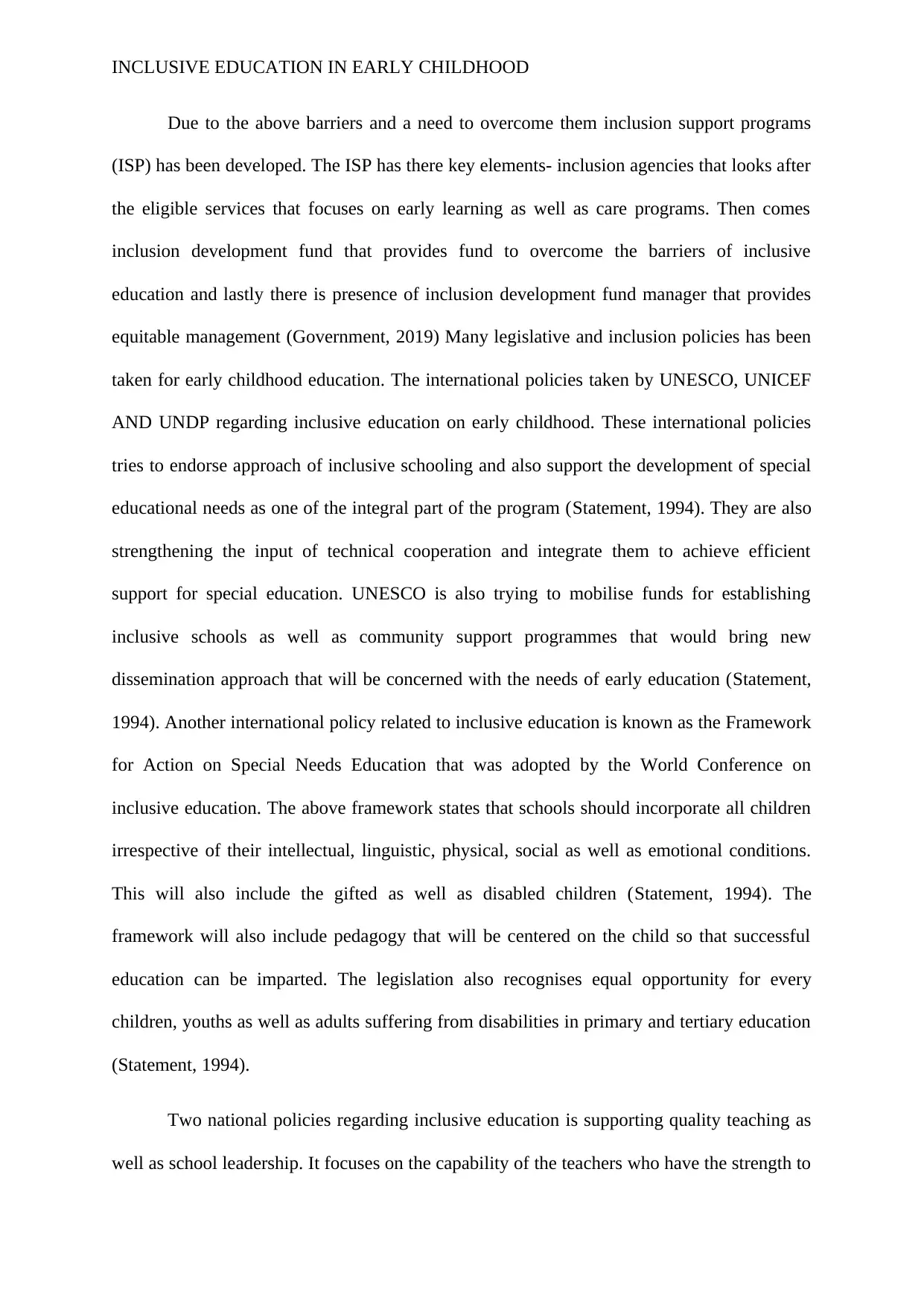
INCLUSIVE EDUCATION IN EARLY CHILDHOOD
Due to the above barriers and a need to overcome them inclusion support programs
(ISP) has been developed. The ISP has there key elements- inclusion agencies that looks after
the eligible services that focuses on early learning as well as care programs. Then comes
inclusion development fund that provides fund to overcome the barriers of inclusive
education and lastly there is presence of inclusion development fund manager that provides
equitable management (Government, 2019) Many legislative and inclusion policies has been
taken for early childhood education. The international policies taken by UNESCO, UNICEF
AND UNDP regarding inclusive education on early childhood. These international policies
tries to endorse approach of inclusive schooling and also support the development of special
educational needs as one of the integral part of the program (Statement, 1994). They are also
strengthening the input of technical cooperation and integrate them to achieve efficient
support for special education. UNESCO is also trying to mobilise funds for establishing
inclusive schools as well as community support programmes that would bring new
dissemination approach that will be concerned with the needs of early education (Statement,
1994). Another international policy related to inclusive education is known as the Framework
for Action on Special Needs Education that was adopted by the World Conference on
inclusive education. The above framework states that schools should incorporate all children
irrespective of their intellectual, linguistic, physical, social as well as emotional conditions.
This will also include the gifted as well as disabled children (Statement, 1994). The
framework will also include pedagogy that will be centered on the child so that successful
education can be imparted. The legislation also recognises equal opportunity for every
children, youths as well as adults suffering from disabilities in primary and tertiary education
(Statement, 1994).
Two national policies regarding inclusive education is supporting quality teaching as
well as school leadership. It focuses on the capability of the teachers who have the strength to
Due to the above barriers and a need to overcome them inclusion support programs
(ISP) has been developed. The ISP has there key elements- inclusion agencies that looks after
the eligible services that focuses on early learning as well as care programs. Then comes
inclusion development fund that provides fund to overcome the barriers of inclusive
education and lastly there is presence of inclusion development fund manager that provides
equitable management (Government, 2019) Many legislative and inclusion policies has been
taken for early childhood education. The international policies taken by UNESCO, UNICEF
AND UNDP regarding inclusive education on early childhood. These international policies
tries to endorse approach of inclusive schooling and also support the development of special
educational needs as one of the integral part of the program (Statement, 1994). They are also
strengthening the input of technical cooperation and integrate them to achieve efficient
support for special education. UNESCO is also trying to mobilise funds for establishing
inclusive schools as well as community support programmes that would bring new
dissemination approach that will be concerned with the needs of early education (Statement,
1994). Another international policy related to inclusive education is known as the Framework
for Action on Special Needs Education that was adopted by the World Conference on
inclusive education. The above framework states that schools should incorporate all children
irrespective of their intellectual, linguistic, physical, social as well as emotional conditions.
This will also include the gifted as well as disabled children (Statement, 1994). The
framework will also include pedagogy that will be centered on the child so that successful
education can be imparted. The legislation also recognises equal opportunity for every
children, youths as well as adults suffering from disabilities in primary and tertiary education
(Statement, 1994).
Two national policies regarding inclusive education is supporting quality teaching as
well as school leadership. It focuses on the capability of the teachers who have the strength to
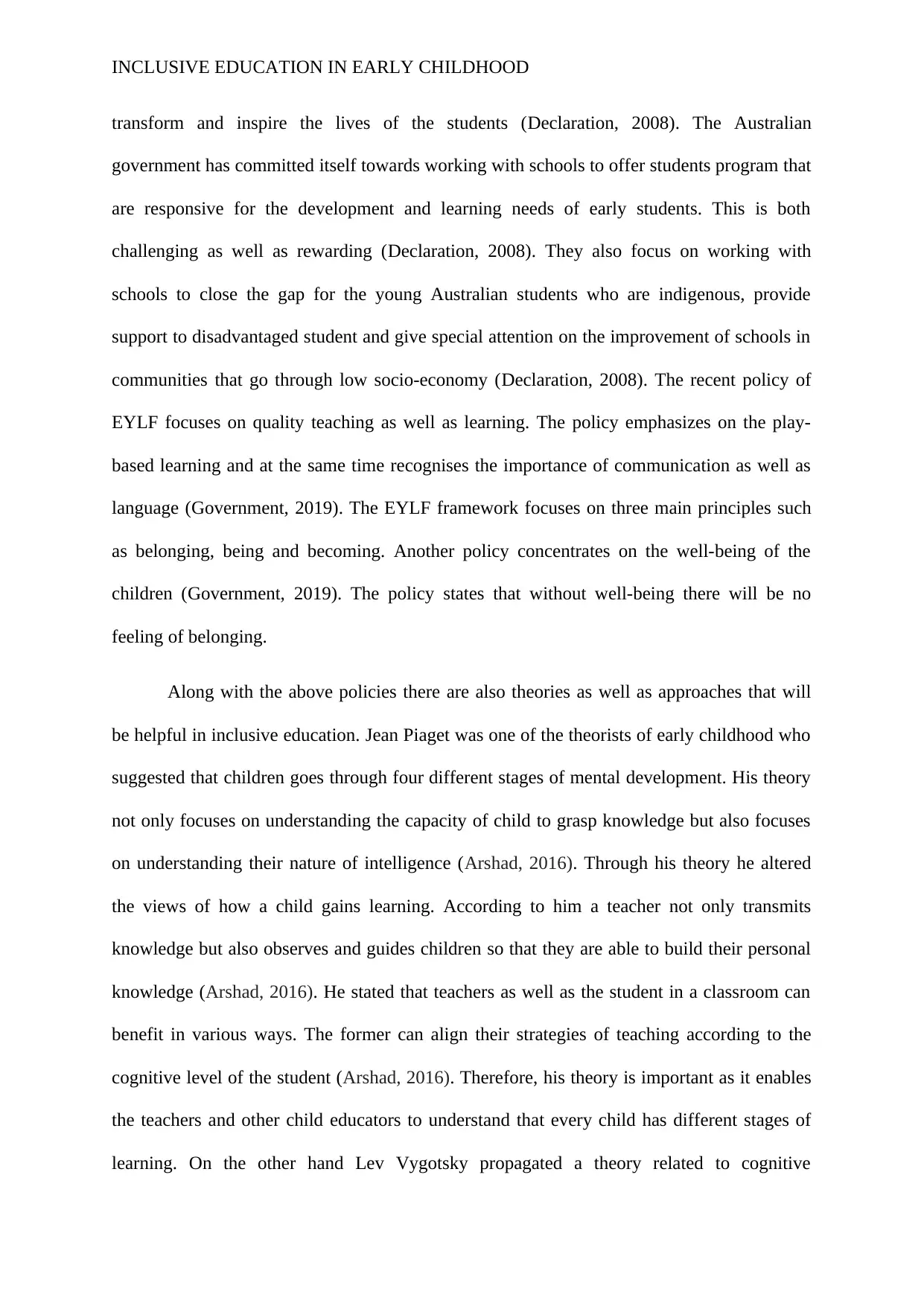
INCLUSIVE EDUCATION IN EARLY CHILDHOOD
transform and inspire the lives of the students (Declaration, 2008). The Australian
government has committed itself towards working with schools to offer students program that
are responsive for the development and learning needs of early students. This is both
challenging as well as rewarding (Declaration, 2008). They also focus on working with
schools to close the gap for the young Australian students who are indigenous, provide
support to disadvantaged student and give special attention on the improvement of schools in
communities that go through low socio-economy (Declaration, 2008). The recent policy of
EYLF focuses on quality teaching as well as learning. The policy emphasizes on the play-
based learning and at the same time recognises the importance of communication as well as
language (Government, 2019). The EYLF framework focuses on three main principles such
as belonging, being and becoming. Another policy concentrates on the well-being of the
children (Government, 2019). The policy states that without well-being there will be no
feeling of belonging.
Along with the above policies there are also theories as well as approaches that will
be helpful in inclusive education. Jean Piaget was one of the theorists of early childhood who
suggested that children goes through four different stages of mental development. His theory
not only focuses on understanding the capacity of child to grasp knowledge but also focuses
on understanding their nature of intelligence (Arshad, 2016). Through his theory he altered
the views of how a child gains learning. According to him a teacher not only transmits
knowledge but also observes and guides children so that they are able to build their personal
knowledge (Arshad, 2016). He stated that teachers as well as the student in a classroom can
benefit in various ways. The former can align their strategies of teaching according to the
cognitive level of the student (Arshad, 2016). Therefore, his theory is important as it enables
the teachers and other child educators to understand that every child has different stages of
learning. On the other hand Lev Vygotsky propagated a theory related to cognitive
transform and inspire the lives of the students (Declaration, 2008). The Australian
government has committed itself towards working with schools to offer students program that
are responsive for the development and learning needs of early students. This is both
challenging as well as rewarding (Declaration, 2008). They also focus on working with
schools to close the gap for the young Australian students who are indigenous, provide
support to disadvantaged student and give special attention on the improvement of schools in
communities that go through low socio-economy (Declaration, 2008). The recent policy of
EYLF focuses on quality teaching as well as learning. The policy emphasizes on the play-
based learning and at the same time recognises the importance of communication as well as
language (Government, 2019). The EYLF framework focuses on three main principles such
as belonging, being and becoming. Another policy concentrates on the well-being of the
children (Government, 2019). The policy states that without well-being there will be no
feeling of belonging.
Along with the above policies there are also theories as well as approaches that will
be helpful in inclusive education. Jean Piaget was one of the theorists of early childhood who
suggested that children goes through four different stages of mental development. His theory
not only focuses on understanding the capacity of child to grasp knowledge but also focuses
on understanding their nature of intelligence (Arshad, 2016). Through his theory he altered
the views of how a child gains learning. According to him a teacher not only transmits
knowledge but also observes and guides children so that they are able to build their personal
knowledge (Arshad, 2016). He stated that teachers as well as the student in a classroom can
benefit in various ways. The former can align their strategies of teaching according to the
cognitive level of the student (Arshad, 2016). Therefore, his theory is important as it enables
the teachers and other child educators to understand that every child has different stages of
learning. On the other hand Lev Vygotsky propagated a theory related to cognitive
⊘ This is a preview!⊘
Do you want full access?
Subscribe today to unlock all pages.

Trusted by 1+ million students worldwide
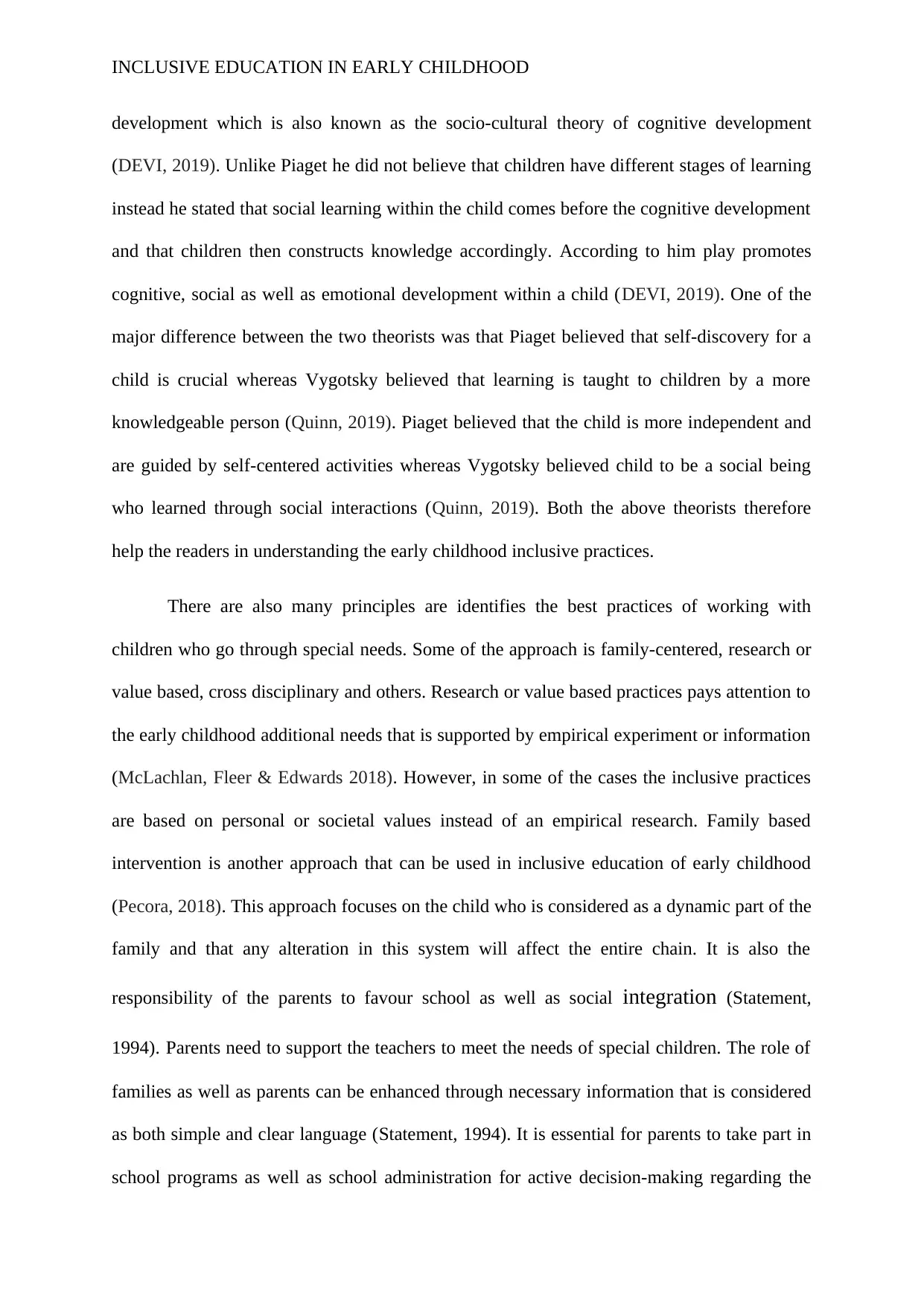
INCLUSIVE EDUCATION IN EARLY CHILDHOOD
development which is also known as the socio-cultural theory of cognitive development
(DEVI, 2019). Unlike Piaget he did not believe that children have different stages of learning
instead he stated that social learning within the child comes before the cognitive development
and that children then constructs knowledge accordingly. According to him play promotes
cognitive, social as well as emotional development within a child (DEVI, 2019). One of the
major difference between the two theorists was that Piaget believed that self-discovery for a
child is crucial whereas Vygotsky believed that learning is taught to children by a more
knowledgeable person (Quinn, 2019). Piaget believed that the child is more independent and
are guided by self-centered activities whereas Vygotsky believed child to be a social being
who learned through social interactions (Quinn, 2019). Both the above theorists therefore
help the readers in understanding the early childhood inclusive practices.
There are also many principles are identifies the best practices of working with
children who go through special needs. Some of the approach is family-centered, research or
value based, cross disciplinary and others. Research or value based practices pays attention to
the early childhood additional needs that is supported by empirical experiment or information
(McLachlan, Fleer & Edwards 2018). However, in some of the cases the inclusive practices
are based on personal or societal values instead of an empirical research. Family based
intervention is another approach that can be used in inclusive education of early childhood
(Pecora, 2018). This approach focuses on the child who is considered as a dynamic part of the
family and that any alteration in this system will affect the entire chain. It is also the
responsibility of the parents to favour school as well as social integration (Statement,
1994). Parents need to support the teachers to meet the needs of special children. The role of
families as well as parents can be enhanced through necessary information that is considered
as both simple and clear language (Statement, 1994). It is essential for parents to take part in
school programs as well as school administration for active decision-making regarding the
development which is also known as the socio-cultural theory of cognitive development
(DEVI, 2019). Unlike Piaget he did not believe that children have different stages of learning
instead he stated that social learning within the child comes before the cognitive development
and that children then constructs knowledge accordingly. According to him play promotes
cognitive, social as well as emotional development within a child (DEVI, 2019). One of the
major difference between the two theorists was that Piaget believed that self-discovery for a
child is crucial whereas Vygotsky believed that learning is taught to children by a more
knowledgeable person (Quinn, 2019). Piaget believed that the child is more independent and
are guided by self-centered activities whereas Vygotsky believed child to be a social being
who learned through social interactions (Quinn, 2019). Both the above theorists therefore
help the readers in understanding the early childhood inclusive practices.
There are also many principles are identifies the best practices of working with
children who go through special needs. Some of the approach is family-centered, research or
value based, cross disciplinary and others. Research or value based practices pays attention to
the early childhood additional needs that is supported by empirical experiment or information
(McLachlan, Fleer & Edwards 2018). However, in some of the cases the inclusive practices
are based on personal or societal values instead of an empirical research. Family based
intervention is another approach that can be used in inclusive education of early childhood
(Pecora, 2018). This approach focuses on the child who is considered as a dynamic part of the
family and that any alteration in this system will affect the entire chain. It is also the
responsibility of the parents to favour school as well as social integration (Statement,
1994). Parents need to support the teachers to meet the needs of special children. The role of
families as well as parents can be enhanced through necessary information that is considered
as both simple and clear language (Statement, 1994). It is essential for parents to take part in
school programs as well as school administration for active decision-making regarding the
Paraphrase This Document
Need a fresh take? Get an instant paraphrase of this document with our AI Paraphraser
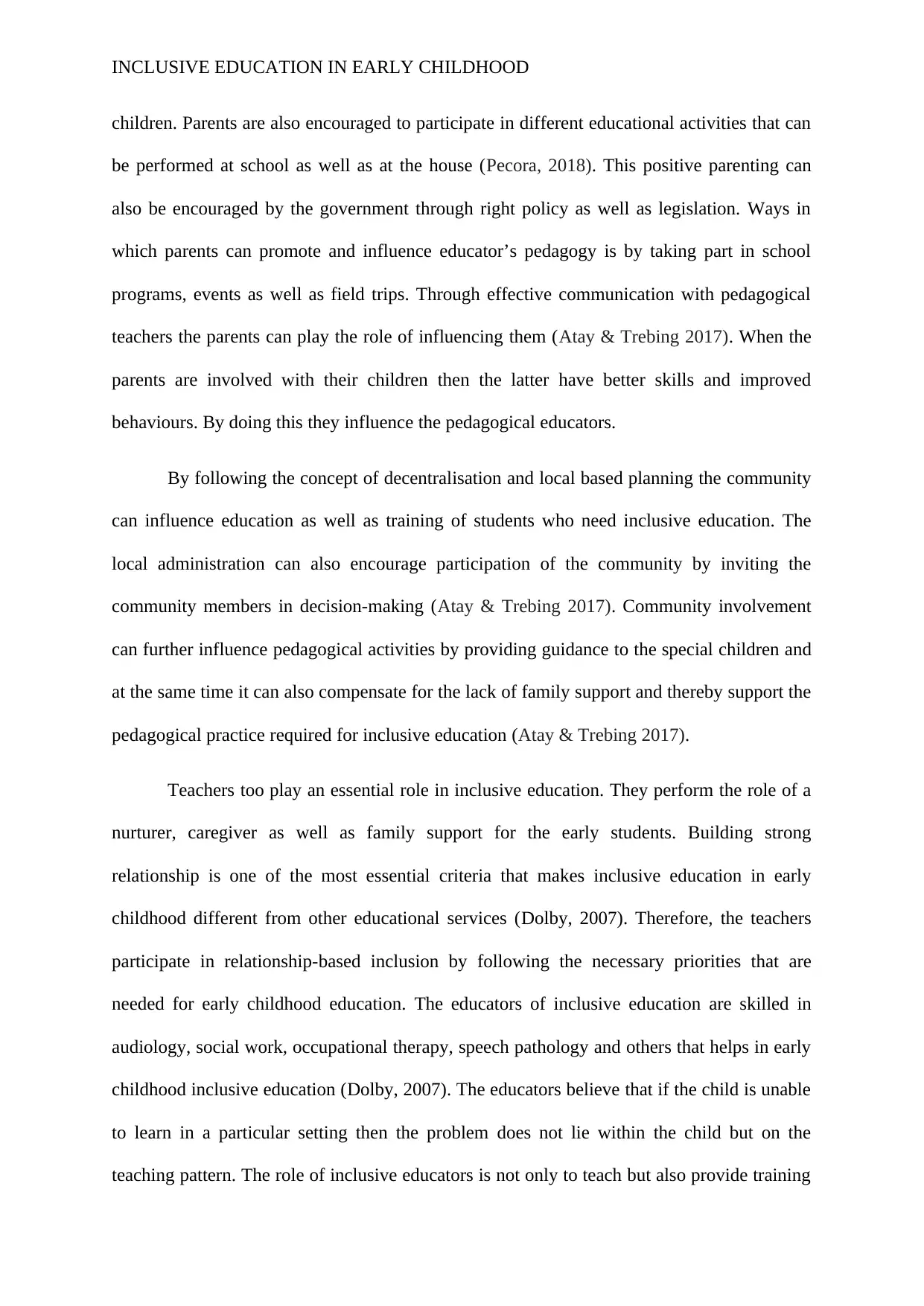
INCLUSIVE EDUCATION IN EARLY CHILDHOOD
children. Parents are also encouraged to participate in different educational activities that can
be performed at school as well as at the house (Pecora, 2018). This positive parenting can
also be encouraged by the government through right policy as well as legislation. Ways in
which parents can promote and influence educator’s pedagogy is by taking part in school
programs, events as well as field trips. Through effective communication with pedagogical
teachers the parents can play the role of influencing them (Atay & Trebing 2017). When the
parents are involved with their children then the latter have better skills and improved
behaviours. By doing this they influence the pedagogical educators.
By following the concept of decentralisation and local based planning the community
can influence education as well as training of students who need inclusive education. The
local administration can also encourage participation of the community by inviting the
community members in decision-making (Atay & Trebing 2017). Community involvement
can further influence pedagogical activities by providing guidance to the special children and
at the same time it can also compensate for the lack of family support and thereby support the
pedagogical practice required for inclusive education (Atay & Trebing 2017).
Teachers too play an essential role in inclusive education. They perform the role of a
nurturer, caregiver as well as family support for the early students. Building strong
relationship is one of the most essential criteria that makes inclusive education in early
childhood different from other educational services (Dolby, 2007). Therefore, the teachers
participate in relationship-based inclusion by following the necessary priorities that are
needed for early childhood education. The educators of inclusive education are skilled in
audiology, social work, occupational therapy, speech pathology and others that helps in early
childhood inclusive education (Dolby, 2007). The educators believe that if the child is unable
to learn in a particular setting then the problem does not lie within the child but on the
teaching pattern. The role of inclusive educators is not only to teach but also provide training
children. Parents are also encouraged to participate in different educational activities that can
be performed at school as well as at the house (Pecora, 2018). This positive parenting can
also be encouraged by the government through right policy as well as legislation. Ways in
which parents can promote and influence educator’s pedagogy is by taking part in school
programs, events as well as field trips. Through effective communication with pedagogical
teachers the parents can play the role of influencing them (Atay & Trebing 2017). When the
parents are involved with their children then the latter have better skills and improved
behaviours. By doing this they influence the pedagogical educators.
By following the concept of decentralisation and local based planning the community
can influence education as well as training of students who need inclusive education. The
local administration can also encourage participation of the community by inviting the
community members in decision-making (Atay & Trebing 2017). Community involvement
can further influence pedagogical activities by providing guidance to the special children and
at the same time it can also compensate for the lack of family support and thereby support the
pedagogical practice required for inclusive education (Atay & Trebing 2017).
Teachers too play an essential role in inclusive education. They perform the role of a
nurturer, caregiver as well as family support for the early students. Building strong
relationship is one of the most essential criteria that makes inclusive education in early
childhood different from other educational services (Dolby, 2007). Therefore, the teachers
participate in relationship-based inclusion by following the necessary priorities that are
needed for early childhood education. The educators of inclusive education are skilled in
audiology, social work, occupational therapy, speech pathology and others that helps in early
childhood inclusive education (Dolby, 2007). The educators believe that if the child is unable
to learn in a particular setting then the problem does not lie within the child but on the
teaching pattern. The role of inclusive educators is not only to teach but also provide training
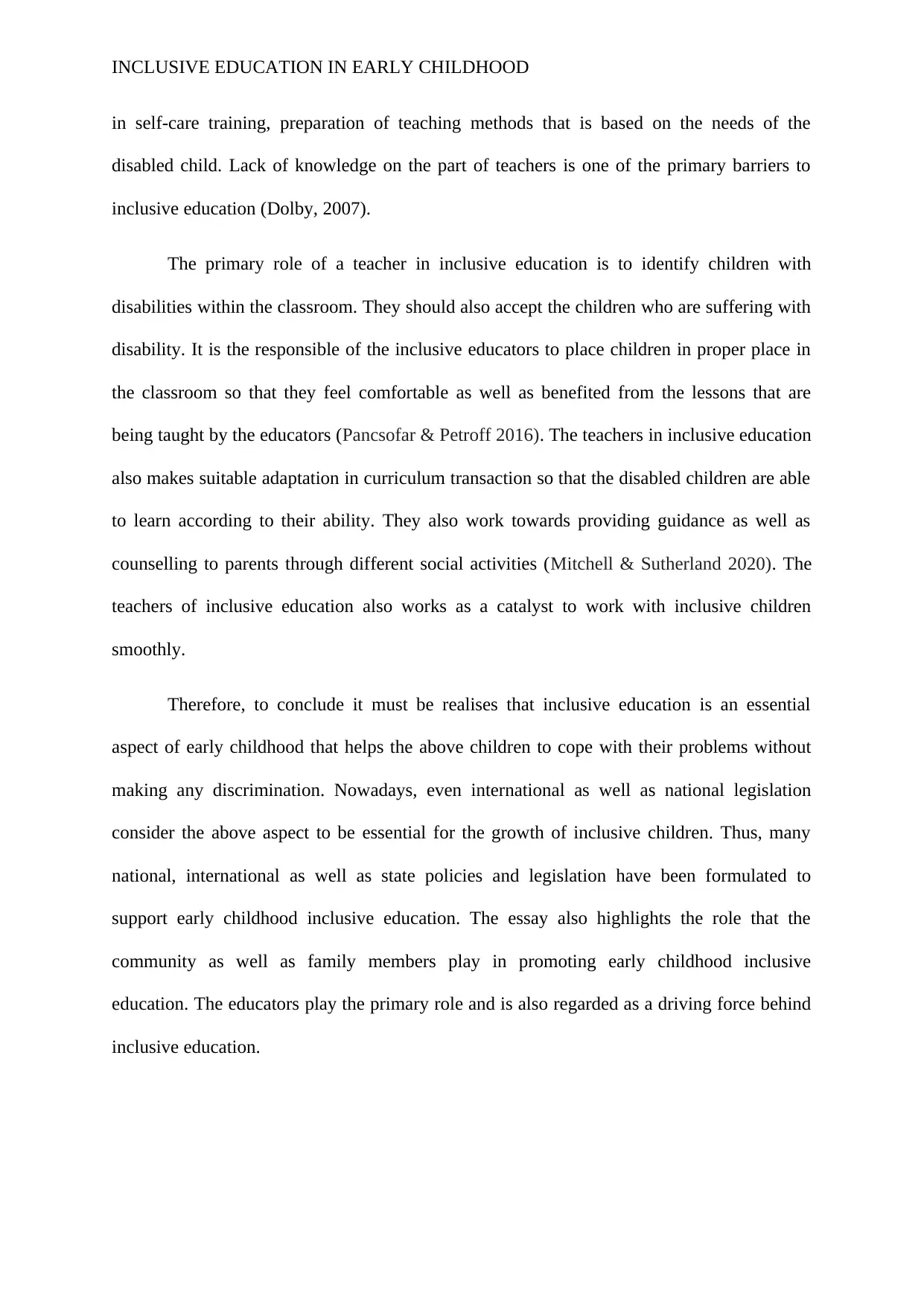
INCLUSIVE EDUCATION IN EARLY CHILDHOOD
in self-care training, preparation of teaching methods that is based on the needs of the
disabled child. Lack of knowledge on the part of teachers is one of the primary barriers to
inclusive education (Dolby, 2007).
The primary role of a teacher in inclusive education is to identify children with
disabilities within the classroom. They should also accept the children who are suffering with
disability. It is the responsible of the inclusive educators to place children in proper place in
the classroom so that they feel comfortable as well as benefited from the lessons that are
being taught by the educators (Pancsofar & Petroff 2016). The teachers in inclusive education
also makes suitable adaptation in curriculum transaction so that the disabled children are able
to learn according to their ability. They also work towards providing guidance as well as
counselling to parents through different social activities (Mitchell & Sutherland 2020). The
teachers of inclusive education also works as a catalyst to work with inclusive children
smoothly.
Therefore, to conclude it must be realises that inclusive education is an essential
aspect of early childhood that helps the above children to cope with their problems without
making any discrimination. Nowadays, even international as well as national legislation
consider the above aspect to be essential for the growth of inclusive children. Thus, many
national, international as well as state policies and legislation have been formulated to
support early childhood inclusive education. The essay also highlights the role that the
community as well as family members play in promoting early childhood inclusive
education. The educators play the primary role and is also regarded as a driving force behind
inclusive education.
in self-care training, preparation of teaching methods that is based on the needs of the
disabled child. Lack of knowledge on the part of teachers is one of the primary barriers to
inclusive education (Dolby, 2007).
The primary role of a teacher in inclusive education is to identify children with
disabilities within the classroom. They should also accept the children who are suffering with
disability. It is the responsible of the inclusive educators to place children in proper place in
the classroom so that they feel comfortable as well as benefited from the lessons that are
being taught by the educators (Pancsofar & Petroff 2016). The teachers in inclusive education
also makes suitable adaptation in curriculum transaction so that the disabled children are able
to learn according to their ability. They also work towards providing guidance as well as
counselling to parents through different social activities (Mitchell & Sutherland 2020). The
teachers of inclusive education also works as a catalyst to work with inclusive children
smoothly.
Therefore, to conclude it must be realises that inclusive education is an essential
aspect of early childhood that helps the above children to cope with their problems without
making any discrimination. Nowadays, even international as well as national legislation
consider the above aspect to be essential for the growth of inclusive children. Thus, many
national, international as well as state policies and legislation have been formulated to
support early childhood inclusive education. The essay also highlights the role that the
community as well as family members play in promoting early childhood inclusive
education. The educators play the primary role and is also regarded as a driving force behind
inclusive education.
⊘ This is a preview!⊘
Do you want full access?
Subscribe today to unlock all pages.

Trusted by 1+ million students worldwide
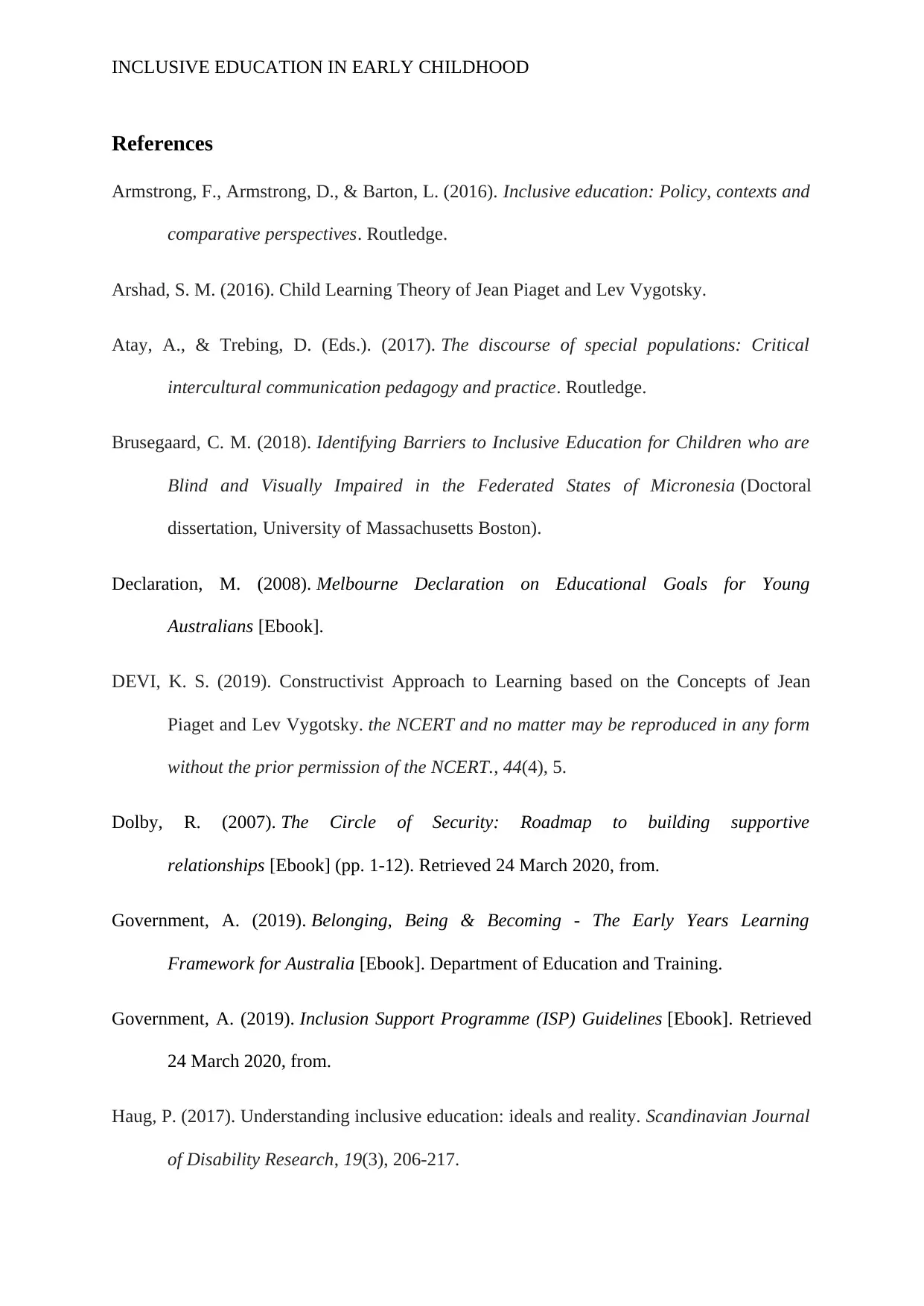
INCLUSIVE EDUCATION IN EARLY CHILDHOOD
References
Armstrong, F., Armstrong, D., & Barton, L. (2016). Inclusive education: Policy, contexts and
comparative perspectives. Routledge.
Arshad, S. M. (2016). Child Learning Theory of Jean Piaget and Lev Vygotsky.
Atay, A., & Trebing, D. (Eds.). (2017). The discourse of special populations: Critical
intercultural communication pedagogy and practice. Routledge.
Brusegaard, C. M. (2018). Identifying Barriers to Inclusive Education for Children who are
Blind and Visually Impaired in the Federated States of Micronesia (Doctoral
dissertation, University of Massachusetts Boston).
Declaration, M. (2008). Melbourne Declaration on Educational Goals for Young
Australians [Ebook].
DEVI, K. S. (2019). Constructivist Approach to Learning based on the Concepts of Jean
Piaget and Lev Vygotsky. the NCERT and no matter may be reproduced in any form
without the prior permission of the NCERT., 44(4), 5.
Dolby, R. (2007). The Circle of Security: Roadmap to building supportive
relationships [Ebook] (pp. 1-12). Retrieved 24 March 2020, from.
Government, A. (2019). Belonging, Being & Becoming - The Early Years Learning
Framework for Australia [Ebook]. Department of Education and Training.
Government, A. (2019). Inclusion Support Programme (ISP) Guidelines [Ebook]. Retrieved
24 March 2020, from.
Haug, P. (2017). Understanding inclusive education: ideals and reality. Scandinavian Journal
of Disability Research, 19(3), 206-217.
References
Armstrong, F., Armstrong, D., & Barton, L. (2016). Inclusive education: Policy, contexts and
comparative perspectives. Routledge.
Arshad, S. M. (2016). Child Learning Theory of Jean Piaget and Lev Vygotsky.
Atay, A., & Trebing, D. (Eds.). (2017). The discourse of special populations: Critical
intercultural communication pedagogy and practice. Routledge.
Brusegaard, C. M. (2018). Identifying Barriers to Inclusive Education for Children who are
Blind and Visually Impaired in the Federated States of Micronesia (Doctoral
dissertation, University of Massachusetts Boston).
Declaration, M. (2008). Melbourne Declaration on Educational Goals for Young
Australians [Ebook].
DEVI, K. S. (2019). Constructivist Approach to Learning based on the Concepts of Jean
Piaget and Lev Vygotsky. the NCERT and no matter may be reproduced in any form
without the prior permission of the NCERT., 44(4), 5.
Dolby, R. (2007). The Circle of Security: Roadmap to building supportive
relationships [Ebook] (pp. 1-12). Retrieved 24 March 2020, from.
Government, A. (2019). Belonging, Being & Becoming - The Early Years Learning
Framework for Australia [Ebook]. Department of Education and Training.
Government, A. (2019). Inclusion Support Programme (ISP) Guidelines [Ebook]. Retrieved
24 March 2020, from.
Haug, P. (2017). Understanding inclusive education: ideals and reality. Scandinavian Journal
of Disability Research, 19(3), 206-217.
Paraphrase This Document
Need a fresh take? Get an instant paraphrase of this document with our AI Paraphraser
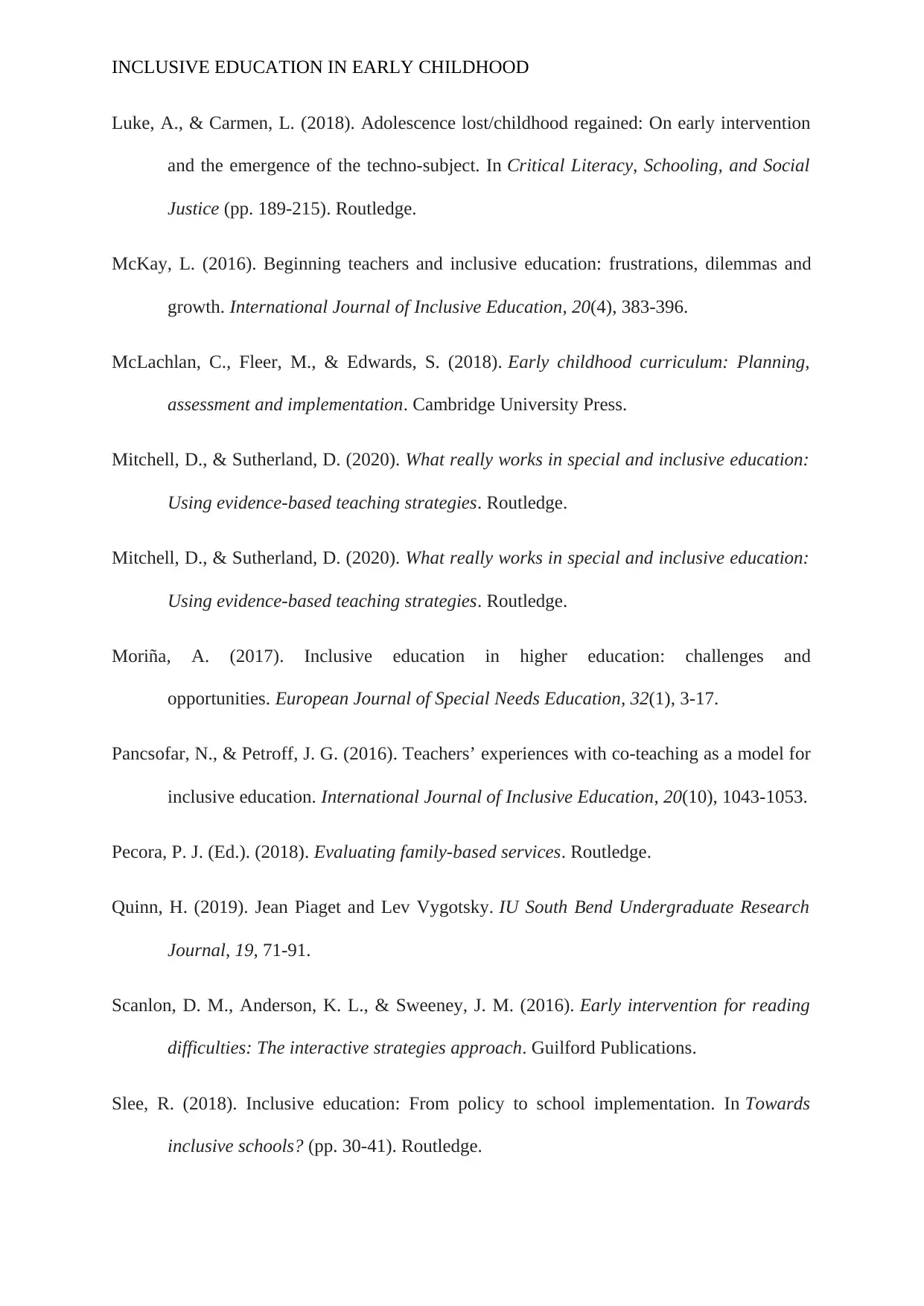
INCLUSIVE EDUCATION IN EARLY CHILDHOOD
Luke, A., & Carmen, L. (2018). Adolescence lost/childhood regained: On early intervention
and the emergence of the techno-subject. In Critical Literacy, Schooling, and Social
Justice (pp. 189-215). Routledge.
McKay, L. (2016). Beginning teachers and inclusive education: frustrations, dilemmas and
growth. International Journal of Inclusive Education, 20(4), 383-396.
McLachlan, C., Fleer, M., & Edwards, S. (2018). Early childhood curriculum: Planning,
assessment and implementation. Cambridge University Press.
Mitchell, D., & Sutherland, D. (2020). What really works in special and inclusive education:
Using evidence-based teaching strategies. Routledge.
Mitchell, D., & Sutherland, D. (2020). What really works in special and inclusive education:
Using evidence-based teaching strategies. Routledge.
Moriña, A. (2017). Inclusive education in higher education: challenges and
opportunities. European Journal of Special Needs Education, 32(1), 3-17.
Pancsofar, N., & Petroff, J. G. (2016). Teachers’ experiences with co-teaching as a model for
inclusive education. International Journal of Inclusive Education, 20(10), 1043-1053.
Pecora, P. J. (Ed.). (2018). Evaluating family-based services. Routledge.
Quinn, H. (2019). Jean Piaget and Lev Vygotsky. IU South Bend Undergraduate Research
Journal, 19, 71-91.
Scanlon, D. M., Anderson, K. L., & Sweeney, J. M. (2016). Early intervention for reading
difficulties: The interactive strategies approach. Guilford Publications.
Slee, R. (2018). Inclusive education: From policy to school implementation. In Towards
inclusive schools? (pp. 30-41). Routledge.
Luke, A., & Carmen, L. (2018). Adolescence lost/childhood regained: On early intervention
and the emergence of the techno-subject. In Critical Literacy, Schooling, and Social
Justice (pp. 189-215). Routledge.
McKay, L. (2016). Beginning teachers and inclusive education: frustrations, dilemmas and
growth. International Journal of Inclusive Education, 20(4), 383-396.
McLachlan, C., Fleer, M., & Edwards, S. (2018). Early childhood curriculum: Planning,
assessment and implementation. Cambridge University Press.
Mitchell, D., & Sutherland, D. (2020). What really works in special and inclusive education:
Using evidence-based teaching strategies. Routledge.
Mitchell, D., & Sutherland, D. (2020). What really works in special and inclusive education:
Using evidence-based teaching strategies. Routledge.
Moriña, A. (2017). Inclusive education in higher education: challenges and
opportunities. European Journal of Special Needs Education, 32(1), 3-17.
Pancsofar, N., & Petroff, J. G. (2016). Teachers’ experiences with co-teaching as a model for
inclusive education. International Journal of Inclusive Education, 20(10), 1043-1053.
Pecora, P. J. (Ed.). (2018). Evaluating family-based services. Routledge.
Quinn, H. (2019). Jean Piaget and Lev Vygotsky. IU South Bend Undergraduate Research
Journal, 19, 71-91.
Scanlon, D. M., Anderson, K. L., & Sweeney, J. M. (2016). Early intervention for reading
difficulties: The interactive strategies approach. Guilford Publications.
Slee, R. (2018). Inclusive education: From policy to school implementation. In Towards
inclusive schools? (pp. 30-41). Routledge.
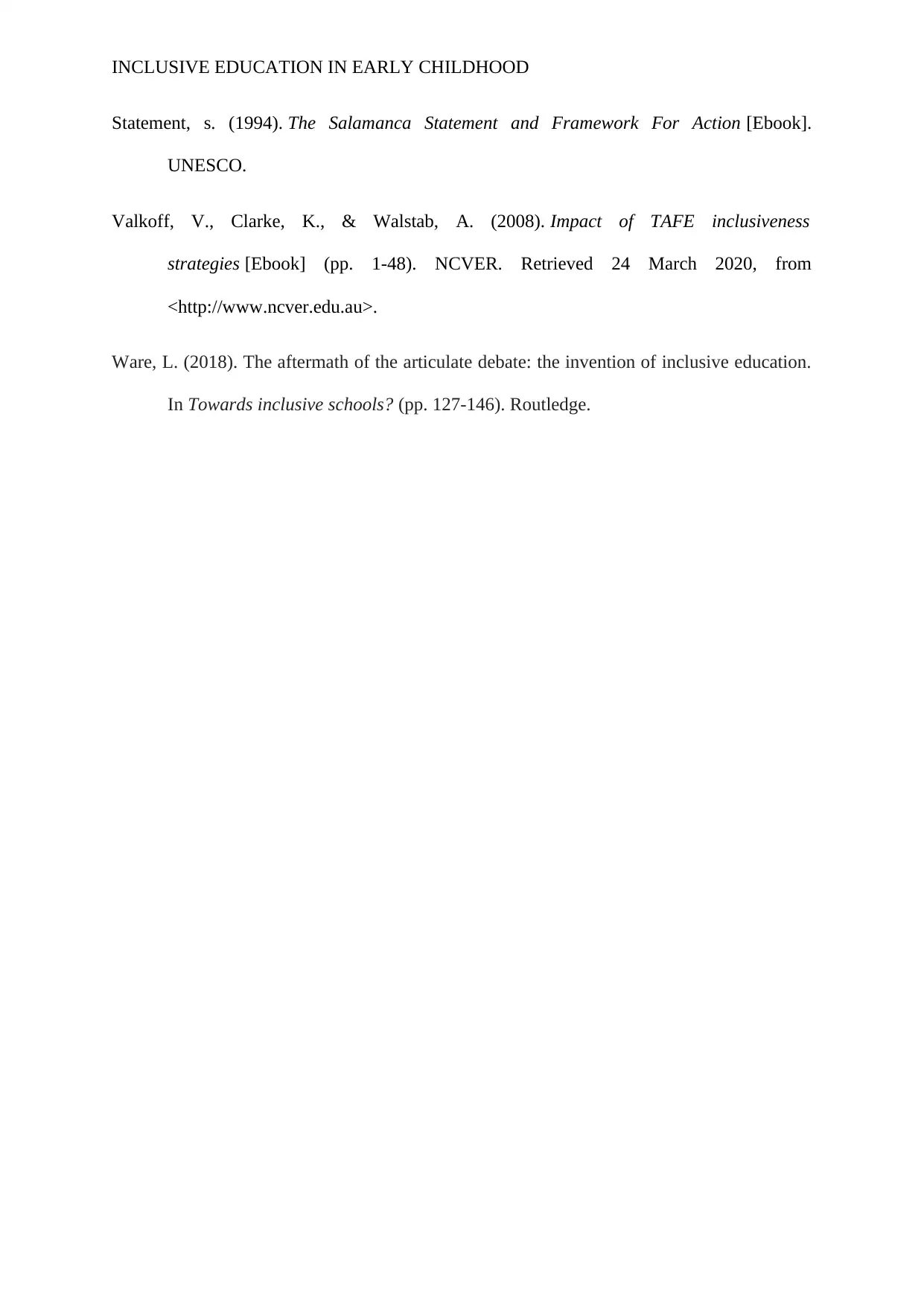
INCLUSIVE EDUCATION IN EARLY CHILDHOOD
Statement, s. (1994). The Salamanca Statement and Framework For Action [Ebook].
UNESCO.
Valkoff, V., Clarke, K., & Walstab, A. (2008). Impact of TAFE inclusiveness
strategies [Ebook] (pp. 1-48). NCVER. Retrieved 24 March 2020, from
<http://www.ncver.edu.au>.
Ware, L. (2018). The aftermath of the articulate debate: the invention of inclusive education.
In Towards inclusive schools? (pp. 127-146). Routledge.
Statement, s. (1994). The Salamanca Statement and Framework For Action [Ebook].
UNESCO.
Valkoff, V., Clarke, K., & Walstab, A. (2008). Impact of TAFE inclusiveness
strategies [Ebook] (pp. 1-48). NCVER. Retrieved 24 March 2020, from
<http://www.ncver.edu.au>.
Ware, L. (2018). The aftermath of the articulate debate: the invention of inclusive education.
In Towards inclusive schools? (pp. 127-146). Routledge.
⊘ This is a preview!⊘
Do you want full access?
Subscribe today to unlock all pages.

Trusted by 1+ million students worldwide
1 out of 12
Related Documents
Your All-in-One AI-Powered Toolkit for Academic Success.
+13062052269
info@desklib.com
Available 24*7 on WhatsApp / Email
![[object Object]](/_next/static/media/star-bottom.7253800d.svg)
Unlock your academic potential
Copyright © 2020–2026 A2Z Services. All Rights Reserved. Developed and managed by ZUCOL.




